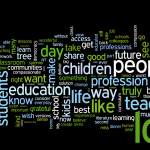This year my school got a site license for Rosetta Stone, an acclaimed online language program that we hope will serve as a strong supplement to our Spanish curriculum. My school, located in Tucson AZ, emphasizes something called "place-based education" which, at its foundation, is about connecting kids to their local community with the intent of creating more engaged active citizens. That said, all of our students study Spanish.
I decided to give Italian a try. My Spanish needs work, no doubt, but the thought of taking my Italian on the road someday to some small village on the Mediterranean sea was just too romantic to pass up. I began on a Saturday morning. By the end of the day, I was able to count, use colors, tell my partner that "the blue bowl is on the table". I couldn't wait until the next day. My exuberance was off the charts.
Sunday brought more numbers, how to ask where something is, and, eventually, a unit on family. The first slide showed a family of four and then slides of each separate family member. I was asked to connect words for "sister" and "son" and "mother" and "father" to the correct images. The next few slides showed people of various cultural backgrounds saying things like"you are my husband" or "this is my daughter". Eventually I got to a slide that showed a White woman in a park looking at a Black boy standing next to her. There were three quotes (all in Italian) from which I was supposed to choose the one that best matched the slide:
1. "You are my sister."
2. "You are not my son."
3. "You are my wife."
Answers 1 and 3 were clearly out of the question, so I was forced to choose answer 2, which was correct as evidenced by the pleasant harp-strumming sound that accompanies every correct answer. But I didn't feel a pleasant harp-strumming. I felt marginalized. One day, when my partner and I are able to make our current family of two into a larger one, it won't look like the family of four in that first slide. In fact, we are more likely to resemble something like this one with the lady and the boy in the park.
As an adult, I have grown accustomed to the cultural "norms" that are so prevalently promoted in our news, advertisements, movies, and curriculum. It exhausts and frustrates me that we have not yet achieved what I would consider an enlightened level of tolerance and diversity, but I know how to navigate the system without feeling dejected on a regular basis. Our students, however, may not possess those tools. They need reinforcement. They need to know that they matter, that their histories are valid, that their identities are valuable.
My exuberance flagged. I came home after work the next day, logged in, and perfunctorily worked through the colors, phrases, numbers, and family members. I got them all correct, but the excitement was gone. I didn't feel any more a part of the Italian language story than the Black boy in the park was supposed to feel a part of the White woman's family.
At the end of this year, House Bill 2281 will likely be signed into law. This bill will effectively outlaw ethnic studies classes which have been especially meaningful for our Mexican-American, African-American and Native American students. These classes have provided an important setting for students who have not been able to see themselves or hear their stories in the traditional curriculum. We learn best when we can form a personal, relevant connection to what is being taught. And when we can't, we shut down.
I'll try to regain my exuberance. I'm not going to let an insensitive software designer ruin my chances at having beautiful-sounding conversations with my funny-looking family, while drinking strong coffee outside of some fantastic Roman cathedral. But there will be hundreds of students who will feel left out once HB 2281 goes into effect, and they may not be able to regain the strong sense of self-esteem and well-being that they have gotten from a curriculum that celebrates their lives and histories.
Where will their tenacity come from? What will keep these students from throwing in the towel and saying, loud and clear, in the words of education advocate Herbert Kohl "I won't learn from you".








